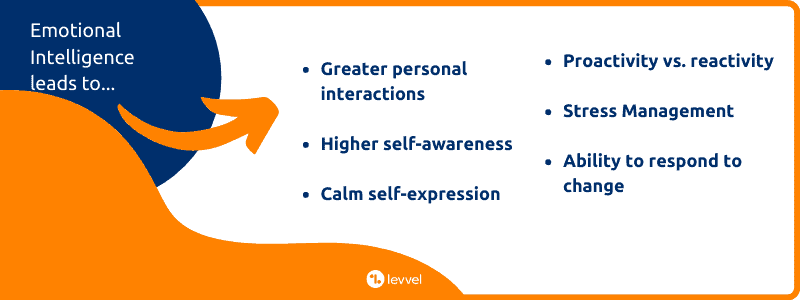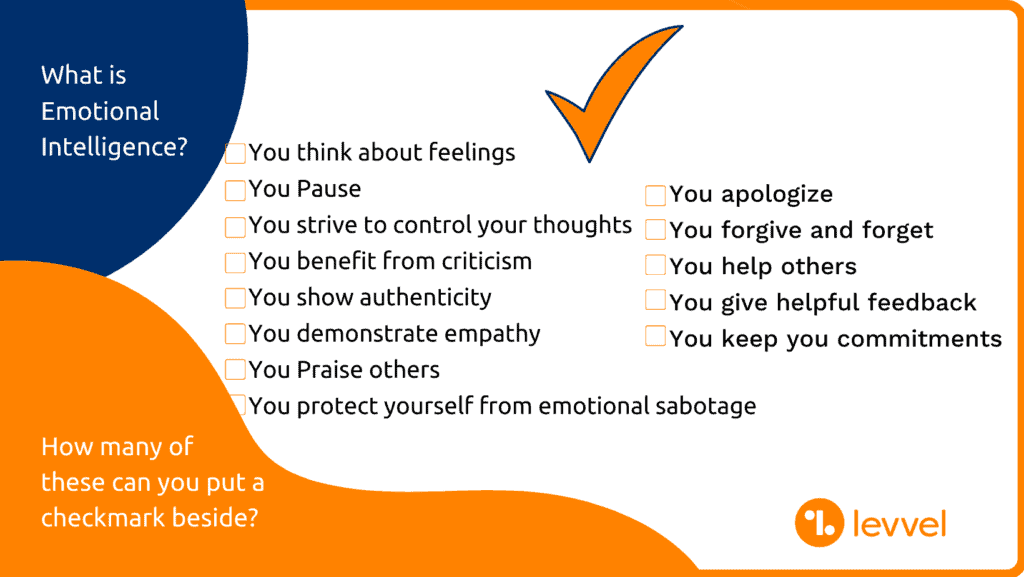In 2016, the World Economic Forum stated that by 2020 emotional intelligence (EI or EQ) would be an essential skill in the workforce. Seems pretty accurate. Today, we live through rapid change that requires a heightened need for leaders to tap into the emotional response of themselves, and their colleagues. But as a leader have you done the work to understand your own EQ and how to manage and understand the EQ of your team members?
The definition of emotional intelligence is an individuals’ capability to recognize their own emotions along with the emotions of others. To discern between different feelings, label them appropriately, and manage or adjust emotions to adapt to environments to achieve one’s goals.

See video: Chantal Milloy, Co-founder & COO of Levvel Inc. talks about EQ and managing change.
If you want to become a connected leader, lead change, and rally the troops you need to have a handle of your own EQ. As change experts, we understand that successful change adoption starts with leadership, and how you present the information is critical to gaining a high level of acceptance in any change process.
Research suggests that 75% of careers are negatively impacted by emotional competency-related issues. These include the inability to respond adaptively to change, nurture trust, lead teams during tough times, and deal effectively with interpersonal problems. Research states that developing your EQ will increase your leadership skills.
Think of all the people you most respect and would like to have as a friend, mentor, or leader? Now think of all the business leaders you’ve had, I’m sure you’ve experienced a variety of leadership styles that imprint positive and negative memories of what you perceive to be good and bad leadership. It’s a good bet that the most respected group have high emotional intelligence.
As the world navigates the pandemic, we’ve seen a shift in business leadership that must include a closer look at the EQ of leaders as they forge through unchartered waters. Instability, uncertainty, and change often elicit an emotional response and while the world begins to recover from COVID-19, the workplace continues to undergo significant change. Leaders are looked upon for guidance and having a high EQ is key to navigating it successfully.
“Now that so many are doing remote work, it’s exasperated the need for heightened EQ. You’re not physically seeing people, but you are virtually in their homes, it’s almost humanized people. I think some good things will come out of this to raise the importance of emotional intelligence.”
Chantal Milloy – Co-founder & COO of Levvel. See video
Many of us have been in professional situations where we’ve felt that a reaction (our own or someone else’s) may have been “blown out of proportion” or conversely, was an “underwhelming response”. Understanding how we all tick and how to manage emotions is fundamental in our personal lives as well as in our business lives. Understanding our emotional processes and developing our EQ can make a big difference in our leadership style which leads to overall job satisfaction and improved career trajectory for you and your team.
We are only human – heard that before – and we’re emotional beings who don’t just shut down emotions in a business setting. What you need to examine, is how those feelings are impacting your reactions and decision making.
So, let’s assess your own EQ as it affects how you perceive and express yourself.
There are three components used in how we interact with others, IQ, EQ, and personality. All three play a factor in how we react. As adults our IQ and personality are already significantly developed, however emotional intelligence is an element that can be nurtured and enhanced. Learning how emotions work can have a significant impact on performance, accomplishments, and relationships.
The Bar-On model of emotional-social intelligence (ESI) Israeli psychologist Reuven Bar-On’s (2006) The ESI Model considers emotional intelligence, social skills, and their facilitators all together. The Model consists of five interrelated competencies, skills, and behavior clusters perceived to impact our well-being and performance. (Bar-On, 2013):
- Being aware of your emotions (Self-Awareness and Self-Expression)
- Expressing your emotions (Social Awareness and Interpersonal Relationships)
- Controlling your emotions (Self-Management and Regulation)
- Change Management
- Self Motivation
In addition to the list above, leaders need to be aware of the moods and emotions of others, to be able to control and manage his or her own emotions, and to influence and manage the emotions of those he or she is leading.

The main takeaway is that all of these are abilities, rather than static, unalterable traits and you can improve your emotional intelligence; here’s how:
Start by breaking down the process. Increase your own self-awareness by identifying key triggers that elicit an emotional response from yourself or others. Actively challenge any distorted thinking patterns and ‘flip the switch’ to appropriate responses when faced with negative emotions or situations.
Chantal Milloy also stresses the importance of self-reflection. Take the time to examine your own strengths, triggers, values, and opportunities and develop them further. It’s also vitally important as a leader to understand and appreciate that others have different triggers and propensity to change. That’s where social awareness must come into play.
A few simple EQ hacks to practice are:
- Identify the trigger, breathe, then respond (take that pause to reflect).
- Check in with the other person, how are they feeling and for clarity of understanding, summarize what they’ve stated showing empathy.
- Don’t do all the talking, be an active listener.
- Recognize your positive emotions and celebrate the things that evoke your own positive feelings. You’ll be better equipped and more resilient when negative things do occur.
Next, take that self-awareness, and effectively manage it.
Self-management is the ability to self-regulate and manage your emotions. The key to strong self-management is taking the needed time to observe your thoughts and feelings and resist the urge to act impulsively. This is an attribute of a great leader. Knowing who you are and what you stand for can better ground you so when situations where your EQ is required, you can control your emotions and handle the situation effectively.
And although EQ is highly beneficial in conflict situations, it also plays a very positive role. It can foster successful business communication as you’re aware of, and sensitive to others’ emotions. As you incorporate those feelings and cues into everyday life, it enhances decision-making and problem-solving, while considering others’ perspectives. Positive emotions follow – and will intrinsically lead to greater compassion, more resiliency when negative things occur, and the ability to expression gratitude. You’re better equipped to examine and celebrate the things that evoke positive feelings in yourself.
~Cherene Kambeitz- Marketing & Communications Director, Levvel Inc. Reach out: connect@levvel.ca


